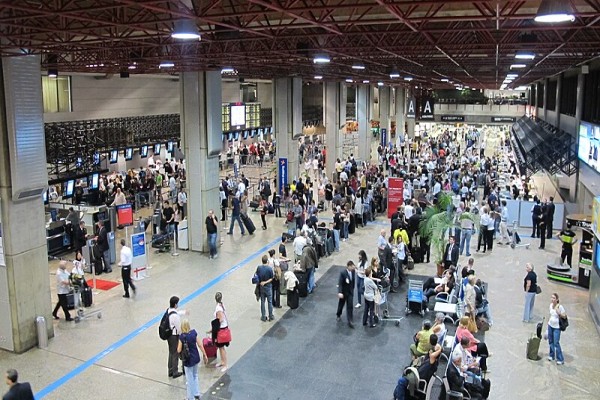BRASILIA: Hundreds of migrants from India, Nepal and Vietnam have been stuck in Sao Paulo’s international airport for weeks in alarming conditions, sleeping on the floor as they wait to enter Brazil.
A spokesman for the Public Defender’s Office said a 39-year-old migrant from Ghana died two weeks ago of unknown causes. It was not clear whether he died while retained at the airport or on the way to hospital.
Asian migrants trapped for weeks in limbo at #Brazil's Guarulhos airport https://t.co/WhODS5cNiW pic.twitter.com/X1Lck1qVYc
— Anthony Boadle (@AnthonyBoadle) August 23, 2024
At least 666 migrants without visas were waiting to enter Brazil at Guarulhos airport, the official said, with the added uncertainty that the government plans to tighten entry rules on Monday to stem a flow of foreigners using Brazil as a stopover to get to the United States and Canada.
The migrants are held in a restricted area where there is no access to a shower and their movements are limited, making it hard for them to obtain food and water, while children and adolescents are enduring winter cold with no blankets, the official said.
The Public Defender’s Office found that the migrants’ human rights were being violated with their health deteriorating.
The agency said conditions for the migrants need to be urgently improved while their status is being resolved, and urged authorities in a statement to comply with Brazil’s legislation based on the humanitarian principle of accepting refugees and not returning them to their country of origin.
Starting on Monday, foreign travelers without a Brazilian visa who are headed for another country must travel straight on to their destination or return to their home country, Brazil’s public security ministry told Reuters on Wednesday.
Brazil has seen a boom in foreign travelers, particularly from Asia, landing in the country for a supposed layover en route to North America, the ministry said in statement.
To enter Brazil, they ask for refugee status, alleging persecution and threats in their home countries, but a majority travel north when they can, according to two reports from
authorities seen by Reuters and a senior police source.
Now, those passengers arriving in Sao Paulo without a visa will not be allowed to stay in Brazil, the ministry said.
It was not clear whether the new rules will apply to migrants already at the Sao Paulo airport or apply only to those arriving after the rules go into effect.
Immigration experts are concerned that the proposed rules counter the 1951 U.N. Refugee Convention, to which Brazil is a party and which calls on countries to take in those at risk in their home country, even if they are undocumented.
The head of Brazil’s refugee committee, Jean Uema, told Reuters the rules would apply specifically to Sao Paulo airport and there would be no change to Brazil’s policy on asylum seekers.
(REUTERS)
In a career spanning three decades and counting, Ramananda (Ram to his friends) has been the foreign editor of The Telegraph, Outlook Magazine and the New Indian Express. He helped set up rediff.com’s editorial operations in San Jose and New York, helmed sify.com, and was the founder editor of India.com.
His work has featured in national and international publications like the Al Jazeera Centre for Studies, Global Times and Ashahi Shimbun. But his one constant over all these years, he says, has been the attempt to understand rising India’s place in the world.
He can rustle up a mean salad, his oil-less pepper chicken is to die for, and all it takes is some beer and rhythm and blues to rock his soul.
Talk to him about foreign and strategic affairs, media, South Asia, China, and of course India.





